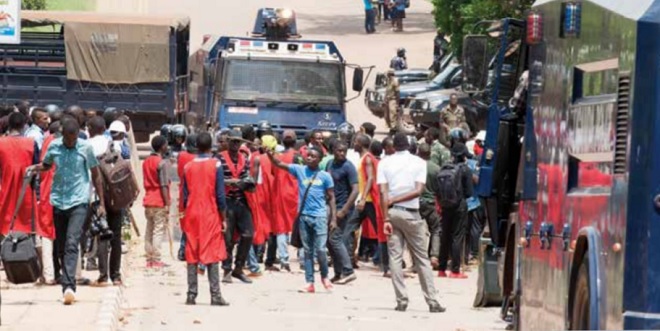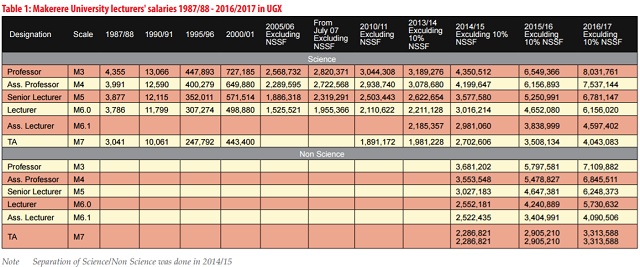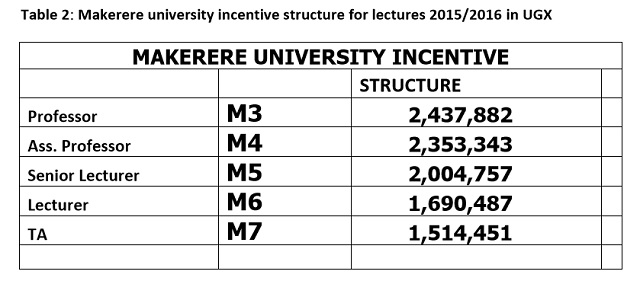
It is now more than a month since President Yoweri Museveni shut down Makerere University. This was because lecturers had abandoned teaching and issued government an ultimatum: pay our unpaid arrears or we will not return to work.
However, the lecturers are not striking over salaries, because these have been paid in full and consistently. Instead their strike is over a strange thing called “incentives”; amalgamated allowances for extra work e.g. when they teach in the evening or on weekends or when they have a very large class with many students’ scripts to mark.
Apparently the university’s top management organ, the University Council, adopted paying these incentives without a proper budget. If it has budgeted it would have realized that the incentive scheme was neither affordable nor sustainable as it is supposed to be paid out of Makerere’s internally generated revenue. These incentives cost Shs 3.7 billion per month or Shs 43 billion a year.
The incentive scheme was created in 2013. This increased the percentage of the university’s total revenue that goes to pay wages alone to 81%. This has meant that the university cannot invest in many other things to enhance education like books, computers, research, laboratory equipment, new buildings, etc. Therefore lecturers at Makerere are milking the university’s ability to serve the broader interests of education. They have turned the university into their ATM.
Remember that even without incentives government pays 76.6% of the lecturers’ salaries while the university contributes 23.4% from its revenues. Secondly, from 2013 up to early this year, Makerere was only able to pay these incentives to its lecturers at the cost of not paying other suppliers of goods and services. By September 2016, the university had accumulated debts of Shs 130 billion. Thus payment for lecturers has dragged the university to near bankruptcy.
Therefore lecturers at Makerere are milking the university’s ability to serve the broader interests of education. They have turned the university into their ATM.
The lecturers’ strike at Makerere is also unfair for another reason. Currently, the university has total enrollment of 39,546 students of whom only 6,324 are sponsored by government. This means that 33,222 (84%) students are self-sponsored i.e. their parents, guardians or themselves pay fees from which 23.4% of lecturers’ salaries are paid. This means private students paid for an education they are not getting. Secondly, nearly all of these students stay in hostels where they had paid for a full semester. None of the hostels accepted to refund their rent when they were sent home.
There is a broader point to be made from the experience of Makerere. The age of “democracy” (although it is better to call it “mobocracy”) is dragging Uganda (and most of Sub Sahara Africa) along a slippery slope of fiscal suicide. Across this vast continent, many governments, in the face of electoral competition, make promises to increase wages of public sector employees beyond what is prudent fiscal management. This problem is most acute in countries where the ruling party faces a risk of losing elections.


For instance in Kenya, Ghana, Zambia, Ivory Coast and Senegal, public sector wages are now between 45% and 55% of the budget against a recommended ceiling of 30%. Zambia and Kenya have recently failed to pay their public sector employees. Consequently they have been forced to borrow from abroad to meet public sector wage obligations at home. This problem is slowly creeping into Uganda whose fiscal regime on public sector wages (they take only 25.4% of the budget) has been very prudent. However, if Uganda continues to try and placate the interests of every powerful group with wage increases, this prudence will collapse.
Makerere lecturers’ wage increases epitomize this trend. In 2013, a professor at Makerere was earning Shs 3.1m. By 2016, this has increased to 8.04m – a 159% increase over three years. So the incentives have existed alongside this rapid increase in their wages that has not been enjoyed by other public sector employees. Indeed, the Makerere Bursar resigned over these incentives saying they were unsustainable. When a new bursar was hired, he protested these incentives saying the university cannot afford and stopped paying.
 The Independent Uganda: You get the Truth we Pay the Price
The Independent Uganda: You get the Truth we Pay the Price




“The lecturers strike at Makerere also could be seen as unfair for another reason. Currently, the university has total enrolment of 39,546 students of whom only 6,324 are sponsored by government. This means that 33,222 students are self-sponsored i.e. their parents, guardians or themselves pay fees from which 23.4% of lecturers’ salaries are paid. To refuse to teach when privately sponsored students constitute 84% of the total student population is unfair.”
In my view, the unfairness of the lecturers to teach should not have been compounded with an even more arbitrary measure by Government to close the university. If security was the problem, the state has the capacity to ensure security of the property and lives both within and outside the University.
The university should have remained open to the 84% private students to enable them access the library for research and continue to benefit from the other amenities like accommodation, meals and etc that they have equally paid for. Even the 16% public sponsored students could have been advised to retain the university for library research as Govt sorts out its responsibilities to its staff. All decisions that the Leadership of Makerere made were with the blessing of the Mother Ministry and all avenues thus existed to solve the problem before it escalated to the point it did. A government loses appearance of control if its perennially in fire-fighting mode.
In a world of advanced e-learning, lecturers form a dying breed of academicians. What the students paid for and desired above all were the facilities and environment to study and research. If government needed to close down anything, it could have suspended its sponsorship program of the 16% Govt aided students so that the incentives package of the lecturers fits within the budget supported by revenues collected from student tuition.
That way it would be left to the public to determine the level of service that the ruling party is offering and whether its in line, or not, with their aspirations as voters and stakeholders; unless off course the state sought to thwart a larger threat with political connotations…
1.Makerere University staff & those from other Public universities are among the top 10 well paid Ugandans. They know this but they are just big headed most graduates are applying to be office attendants coz they are paid 800k they hide their degree transcripts & strategically submit their O’level during interviews.
2. The university was closed coz of big headedness on the part of both students & staff we had to deflate their heads abit.
3.It would be better to have 2 categories of permanent staff i.e those employed to teach govt students & those to teach private students otherwise the fees collected from private sponsored students is seen as mana from heaven.( i am told each lecturer has a calculator to compute fees collected from private students that’s why their appetite for cash is high)
4.Most Ugandans believe that govt should be bullied into submission whether they work or not actually, most staff at MUK are on sabbatical leave they get full salary from MUK and abroad.(isnt this abuse of office?)
5.The economy class of planes departing from Entebbe is filled to capacity with lecturers traveling to present papers abroad you wonder when they teach.
6.There is a craze for all lecturers to have PhD’s they are actually getting PhDs haphazardly through staff development Commitees will the aim of “catching” the 15m M7 promised .
7. The Title Assoc.Prof or Prof is so simple to obtain especially in the humanities field of study. One just needs to attend conferences even if its in Kasese then paid someone to vet your publications then you are good to go.
8.I find it so funny that most civil servants will serve the nation for over 40 years with a low pay without quitting what does this mean?it means that most civil servants cant be employeed in reputable institutions coz of their bad manners & poor working ethics.
9.Ugandans are found of using govt institutions as a stepping stone for their selfish interest and they are not ashamed to do so e.g Govt funded the studies of Godber Tumushabe ,Onyango & Nuwagaba Justus but they are our biggest critics they charge govt for advise they have forgotten that govt is the biggest marketing manager of all ugandans abroad.
10.Dr.Nyanzi Stella undressed coz of the money.
But, in case you are in New York City, it is
really not possible for many to get a bag for $1,000.
Since most branded merchandise is highly priced, we need to seek out other
ideal and smart ways to enjoy the good thing about them.
There are even diaper bags which do not even seem like diaper bags from your outside.